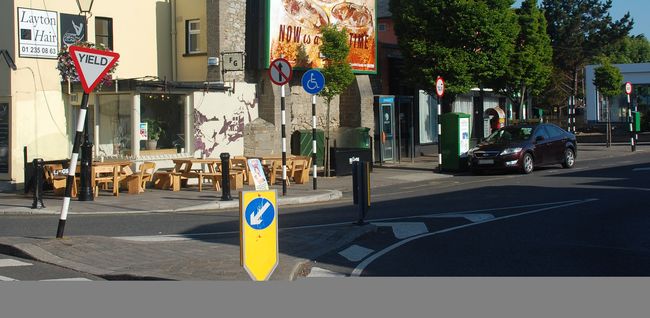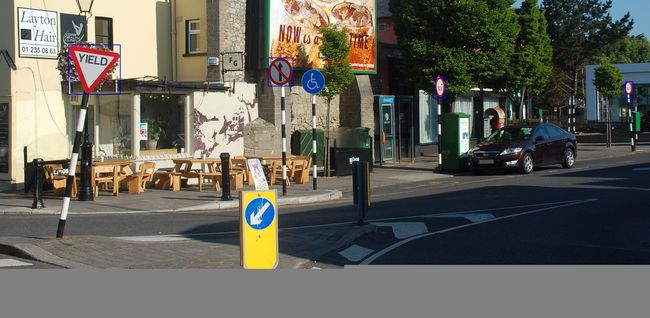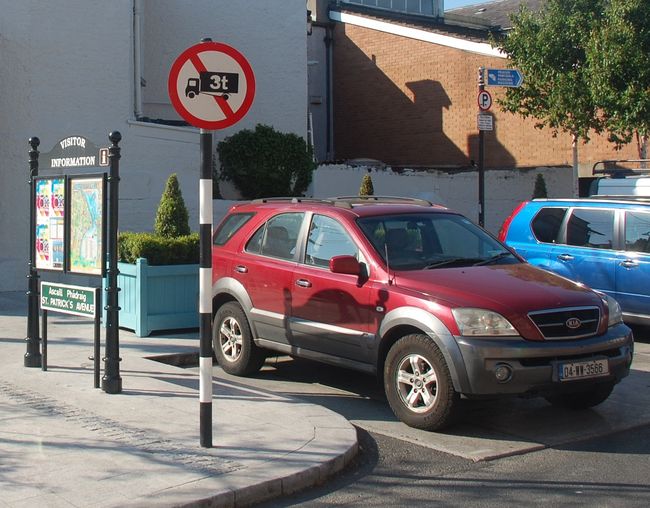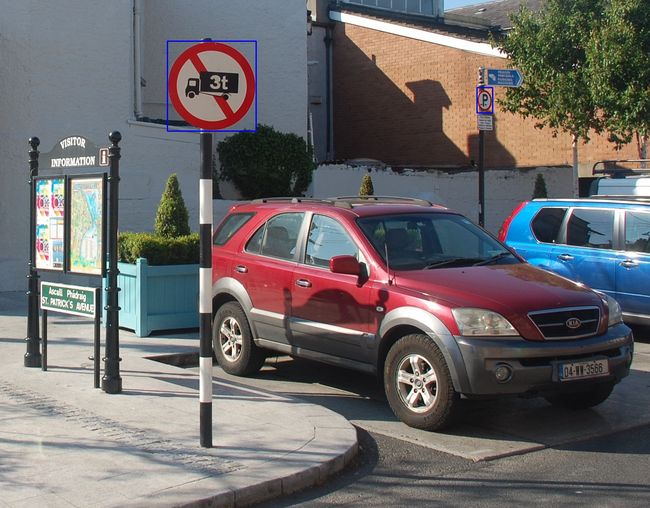Opencv3+VS2017实现交通标志检测
可靠的交通标志检测是对其进行准确识别的前提,本次作业首先利用交通标志的红色特征域分割出潜在的交通标志区域,然后通过中值滤波、腐蚀、膨胀与填充操作,初步抑制目标图像的噪声,分割出交通标志独立的图像元素,接着针对交通标志具有规则的形状这一关键特征,通过轮廓提取,Harris角点检测方法最终确定出图像中的交通标志区域,实验结果表明了该算法的有效性。
下面是原图与检测后的对比图。
下面是具体程序,环境为Opencv3.4.1 + VS2017:
//在编译运行源代码之前,需将87行与214行的输入与输出路径更改为当前电脑图片所在绝对路径
#include
#include
#define PI 3.1415926
using namespace std;
using namespace cv;
void RGB2HSV(double red, double green, double blue, double& hue, double& saturation, double& intensity)
{
double r, g, b;
double h, s, i;
double sum;
double minRGB, maxRGB;
double theta;
r = red / 255.0;
g = green / 255.0;
b = blue / 255.0;
minRGB = ((r < g) ? (r) : (g));
minRGB = (minRGB < b) ? (minRGB) : (b);
maxRGB = ((r > g) ? (r) : (g));
maxRGB = (maxRGB > b) ? (maxRGB) : (b);
sum = r + g + b;
i = sum / 3.0;
if (i < 0.001 || maxRGB - minRGB < 0.001)
{
h = 0.0;
s = 0.0;
}
else
{
s = 1.0 - 3.0*minRGB / sum;
theta = sqrt((r - g)*(r - g) + (r - b)*(g - b));
theta = acos((r - g + r - b)*0.5 / theta);
if (b <= g)
h = theta;
else
h = 2 * PI - theta;
if (s <= 0.01)
h = 0;
}
hue = (int)(h * 180 / PI);
saturation = (int)(s * 100);
intensity = (int)(i * 100);
}
void fillHole(const Mat srcBw, Mat &dstBw)
{
Size m_Size = srcBw.size();
Mat Temp = Mat::zeros(m_Size.height + 2, m_Size.width + 2, srcBw.type());
srcBw.copyTo(Temp(Range(1, m_Size.height + 1), Range(1, m_Size.width + 1)));
cv::floodFill(Temp, Point(0, 0), Scalar(255));
Mat cutImg;
Temp(Range(1, m_Size.height + 1), Range(1, m_Size.width + 1)).copyTo(cutImg);
dstBw = srcBw | (~cutImg);
}
//判断rect1与rect2是否有交集
bool isInside(Rect rect1, Rect rect2)
{
Rect t = rect1&rect2;
if (rect1.area() > rect2.area())
{
return false;
}
else
{
if (t.area() != 0)
return true;
}
}
int main()
{
Mat srcImg = imread("G:\\courseStudy\\opencv\\homework1\\homework-1\\RoadSigns1.jpg");
Mat srcImgCopy;
srcImg.copyTo(srcImgCopy);
//红色色彩分割
int width = srcImg.cols;//图像宽度
int height = srcImg.rows;//图像高度
double B = 0.0, G = 0.0, R = 0.0, H = 0.0, S = 0.0, V = 0.0;
Mat matRgb = Mat::zeros(srcImg.size(), CV_8UC1);
int x, y; //循环
for (y = 0; y < height; y++)
{
for (x = 0; x < width; x++)
{
// 获取BGR值
B = srcImg.at(y, x)[0];
G = srcImg.at(y, x)[1];
R = srcImg.at(y, x)[2];
RGB2HSV(R, G, B, H, S, V);
//红色范围
if ((H >= 330 && H <= 360 || H >= 0 && H <= 10) && S >= 21 && S <= 100 && V > 16 && V < 99) //H不能低于10,H不能大于344,S不能高于21,V不能变
{
matRgb.at(y, x) = 255;
}
}
}
imshow("hsv", matRgb);
// 中值滤波
medianBlur(matRgb, matRgb, 3);
medianBlur(matRgb, matRgb, 5);
imshow("medianBlur", matRgb);
Mat element = getStructuringElement(MORPH_ELLIPSE, Size(2 * 1 + 1, 2 * 1 + 1), Point(1, 1));
Mat element1 = getStructuringElement(MORPH_ELLIPSE, Size(2 * 3 + 1, 2 * 3 + 1), Point(3, 3));
erode(matRgb, matRgb, element);//腐蚀
imshow("erode", matRgb);
dilate(matRgb, matRgb, element1);//膨胀
imshow("dilate", matRgb);
fillHole(matRgb, matRgb);//填充
imshow("fillHole", matRgb);
Mat matRgbCopy;
matRgb.copyTo(matRgbCopy);
//找轮廓
vector>contours; //轮廓
vector hierarchy;//分层
findContours(matRgb, contours, hierarchy, CV_RETR_EXTERNAL, CV_CHAIN_APPROX_SIMPLE, Point(0, 0));//寻找轮廓
vector> contours_poly(contours.size()); //近似后的轮廓点集
vector boundRect(contours.size()); //包围点集的最小矩形vector
//画轮廓
for (int i = 0; i < contours.size(); i++)
{
approxPolyDP(Mat(contours[i]), contours_poly[i], 3, true); //对多边形曲线做适当近似,contours_poly[i]是输出的近似点集
boundRect[i] = boundingRect(Mat(contours_poly[i])); //计算并返回包围轮廓点集的最小矩形
}
//对提取出的轮廓进行去噪,筛选出交通标志
Mat drawing = Mat::zeros(matRgb.size(), CV_8UC3);
for (int i = 0; i < contours.size(); i++)
{
Rect rect = boundRect[i];
//首先进行一定的限制,筛选出区域
//若轮廓矩形内部还包含着矩形,则将被包含的小矩形取消
bool inside = false;
for (int j = 0; j < contours.size(); j++)
{
Rect t = boundRect[j];
if (rect == t)
continue;
else if (isInside(rect, t))
{
inside = true;
break;
}
}
if (inside)
continue;
//高宽比限制
float ratio = (float)rect.width / (float)rect.height;
//轮廓面积限制
float Area = (float)rect.width * (float)rect.height;
float dConArea = (float)contourArea(contours[i]);
float dConLen = (float)arcLength(contours[i], 1);
if (dConArea < 700)
continue;
if (ratio > 1.3 || ratio < 0.4)
continue;
//画轮廓识别框
Scalar color = (0, 0, 255);//蓝色线画轮廓
drawContours(drawing, contours_poly, i, color, 1, 8, vector(), 0, Point());
rectangle(drawing, boundRect[i].tl(), boundRect[i].br(), color, 2, 8, 0);
rectangle(srcImg, boundRect[i].tl(), boundRect[i].br(), color, 2, 8, 0);
imshow("drawing.jpg", drawing);
//Harris角点检测,去除掉不规则轮廓
Mat grayImg, dstImg, normImg, scaledImg;
cvtColor(drawing, grayImg, COLOR_BGR2GRAY);
cornerHarris(grayImg, dstImg, 2, 3, 0.04);
//归一化与转换
normalize(dstImg, normImg, 0, 255, NORM_MINMAX, CV_32FC1, Mat());
convertScaleAbs(normImg, scaledImg);
int harrisNum = 0;
for (int j = 0; j < normImg.rows; j++)
{
for (int i = 0; i < normImg.cols; i++)
{
if ((int)normImg.at(j, i) > 160)
{
circle(scaledImg, Point(i, j), 4, Scalar(0, 10, 255), 2, 8, 0);
harrisNum++;
}
}
}
if(harrisNum > 33)//当角点数目大于33,则忽略此轮廓
continue;
imshow("result.jpg", srcImg);
imshow("cornerHarris.jpg", scaledImg);
imwrite("G:\\courseStudy\\opencv\\homework1\\homework-1\\result1.jpg", srcImg);//保存最终的检测识别结果
}
waitKey(0);
return 0;
} 


